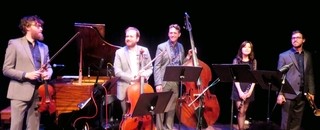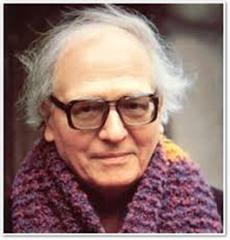|
Back
Playing with Heavenly Fire New York
nancy manocherian’s the cell
06/13/2019 -
Olivier Messiaen: Quatuor pour la fin du Temps (Arranged by Ben Russell and Brandon Ridenour)
Tribeca New Music Festival-The Cell: Founders: Ben Russell (Violin/Vocals), Brandon Ridenour (Trumpet/Piano), Hamilton Berry (Cello/Vocals), Yoonah Kim (Clarinet), Greg Chudzik (Bass)

B. Russell, H. Berry, G. Chudzik, Y. Kim, B. Ridenour
(© Samuel A. Dog)
“...There’s music in all things if men had ears;/Their earth is but an echo of the spheres.”
Lord George Byron (1788-1824)
“I give bird songs to those who dwell in cities and have never heard them, make rhythms for those who know only military marches or jazz, and paint colors for those who see none.”
Olivier Messiaen (1908-1992)
Ha! So that defiant, brilliant, virtuosic quintet called Founders think that they can “out-syncretic” the greatest musical syncreticist of the last century, Olivier Messiaen? Bah! Fiddlesticks!
Last night, the violinist and trumpet-player of Founders “re-arranged” Messiaen’s Quartet for the End of Time, turning the quartet to a quintet, adding jazz riffs and Bulgarian strumming, augmenting a solo clarinet with a variety of trumpets and intoning a few churchly Latin phrases.
This for one of the three most influential composers of the 20th Century, a man who encompassed and articulated erotic sex, Catholic adoration, the dances of Shiva, calls from 100 different birds, the synesthesia of color and tones, the passion of the original Iseult, Wagner’s Tristan and Isolde, tone-rows and religious dazzlement.
As well as words which (in French or English) could resonate with the magical styles of William Blake, the Book of Revelations, the Bhagvad Gita, Rumi, Li Po, Rimbaud, Hildegarde of Bingen and Walt Whitman.
All in music which can never be totally explained yet which is unquestionably–and irreducibly–Olivier Messiaen.
One factor which Founders got right in their performance last night at The Cell was that this was a singular concept. Not to everybody’s taste, but certainly Messrs Russell and Ridenour had an integrity in supposedly bringing Messiaen up to date.
A speaker before the performance noted that few in the audience knew much about Messiaen. For them, this music might have seemed clever but cold. Some excellent playing, a few familiar bluesy notes, and a bit of Latin.
Those who were a bit familiar with Quartet for the End of Time could respect the playing. But Olivier Messiaen intended–in a work written while imprisoned in a German prisoners camp using the only instruments available–a sense of celestial power.
Not necessarily religious (after all, the original clarinetist was a secular Jew), but an unconditional numinous luminosity. (Or luminous numinosity, if you prefer.)
That, alas, was missing. Missing, at least, to those of us who heard the extraordinary performance five months ago in the Crypt below the Church of the Annunciation (one of Andrew Ousley’s superb productions). In fact, Yoonah Kim, the clarinetist of Founders may have had a bi-polar auditory experience last night, as she was the soloist both in the Crypt and in The Cell.

O. Messiaen
She excelled in both, though in the original concert, Ms. Kim had the long clarinet solo for The Abyss of the Birds. This is the extreme test for any clarinetist, the start of Messiaen’s life-long exploration of avian sounds. Last night, though, she was joined by trumpet player Brandon Ridenour, whose duet included a variety of instruments (one abbreviated trumpet, one bugle-like instrument) and mutes The duet lost the austerity, the sounds of the solitary birds, yet it was perhaps more accessible, more congenial.
Missing also were the Messiaen words for each section, though these are omitted during any performance. The original words started the concert here, soloed by violinist Ben Russell and echoed with various harmonies by the rest of the ensemble before the instruments.
This was a mixed bag, to say the least. The penultimate Announcement: Clutter of Rainbows (a horrible translation for the more heavenly “Tangle of rainbows, for the Angel who announces the end of time”) gave the group the chance to go their own way, with gorgeous strumming/pizzicato strings, whirling winds. Before that, the Dance of Fury allowed the brilliant soloists for more variations on the original Messiaen. (Including a military tattoo from the bugle.)
This reviewer’s favorite was, yes, the movement closest to Messiaen’s original, for Jesus Eternal. Here, cellist Hamilton Berry started the dense measures (in my score, “infinitely slow, ecstatic”), joined by the rest of the ensemble for a mood which is supposed to show “the eternity of the Word...whose time never runs out.”
Frankly, had Founders decided to jazz up that movement, time might not have run out. But this writer might have walked out. No, Founders here kept to the essence of the original, the four other instruments taking the place of the piano.
The finale started with a few Latin words (“Dominus...Requiem”), then all the instruments gradually enlarged on the original theme of the first movement, albeit with a bit of blues, a little syncopation. The original is simply a violin solo, akin to the cello of the fifth movement, and one missed the singularity of “The Word” in order for a more orderly end.
Bach was never a purist in arranging the music of other composers, so a Mandarin attitude is out of place here. Yet the very peculiar moods of Messiaen, when touched up, when subtly jazzed up, when given different timbres, don’t produce another work. Even with five such brilliant musicians, the fragments of the original become shards rather than holy shadows.
After the intermission, Founders was set to play Songs for the End of Time composed by the same artists, yet I didn’t stay. While their Messiaen had shortcomings in my ear, their audacity was a worthy one, and I didn’t relish a few probably worthy notes to overcome the memory of Messiaen’s irreducible masterpiece.
Harry Rolnick
|